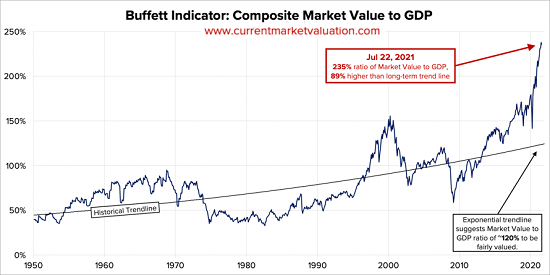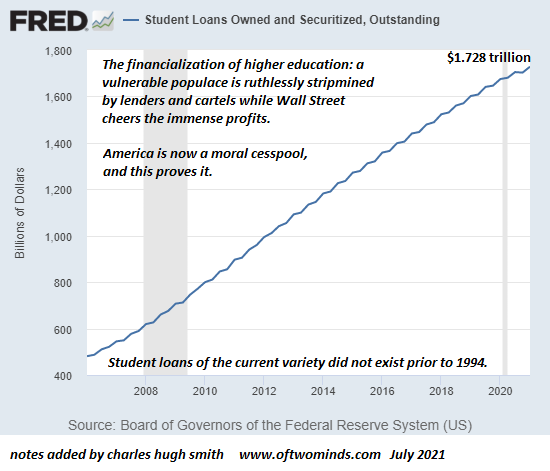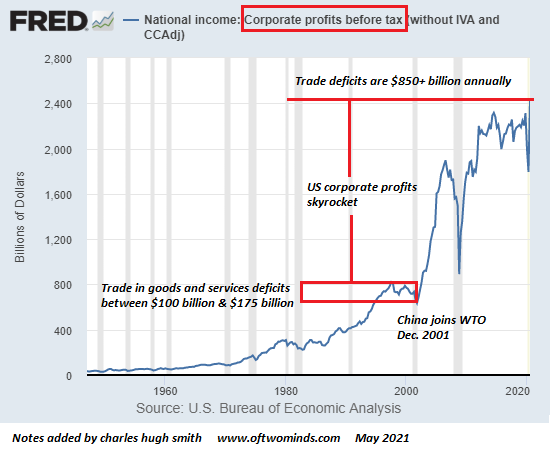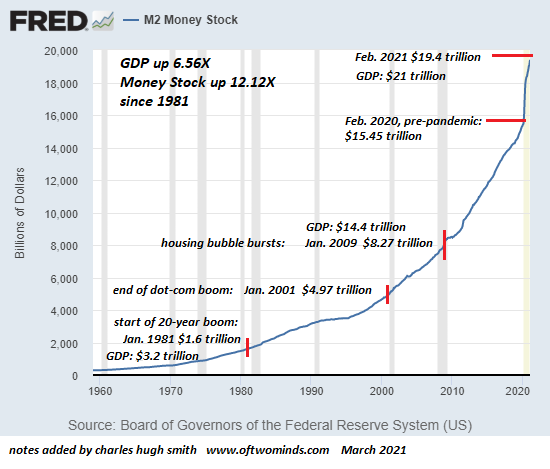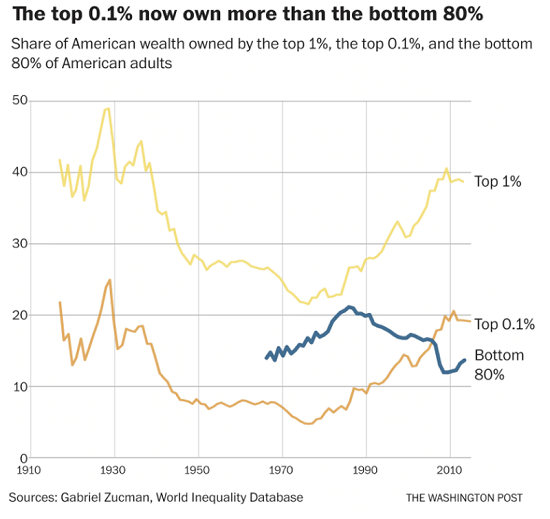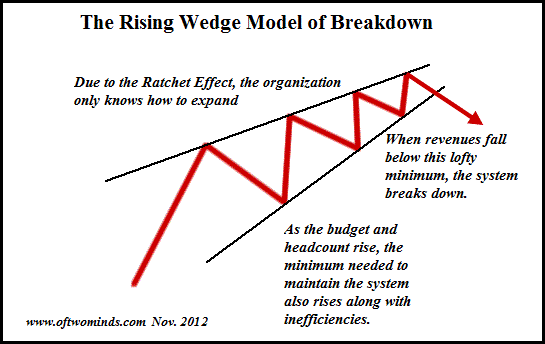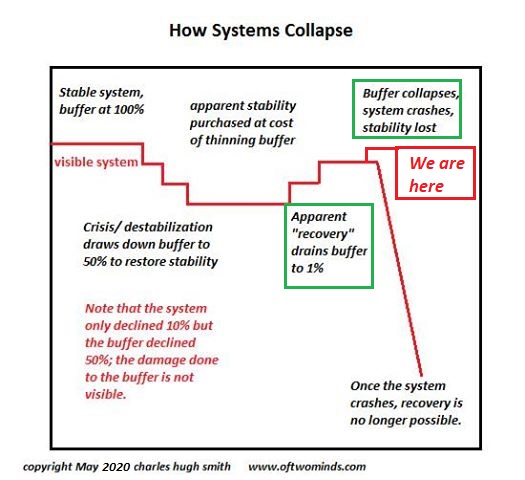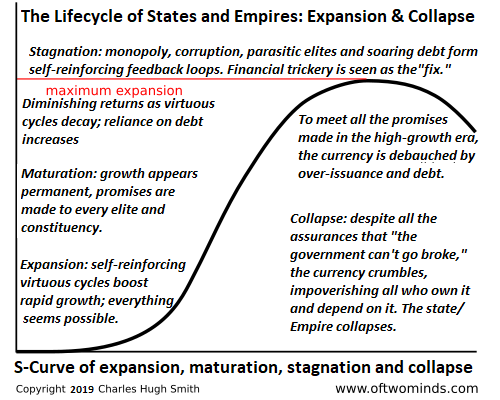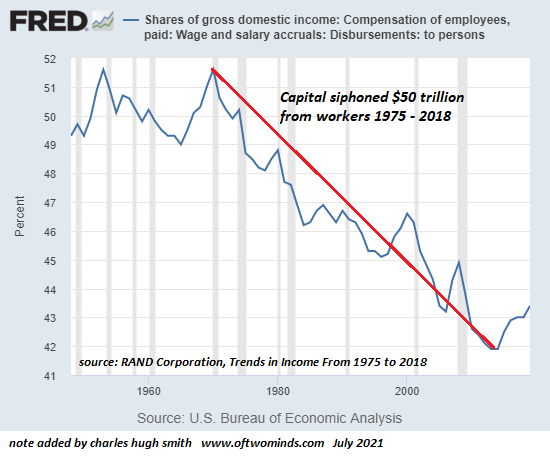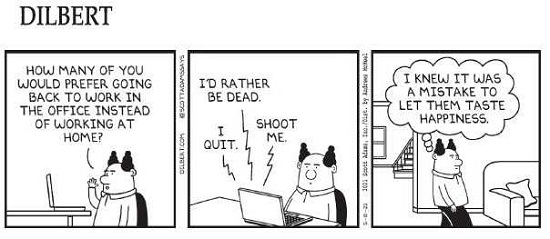Why Don't Billionaires Pay the Same High Tax Rates the Rest of Us Pay?
The truth is America has lost its way if commoners pay a rate of 40% but its
billionaires pay next to nothing.
As with everything else in polarized America, billionaires proclaiming space tourism is
the next big thing for humanity neatly divides opinion into two camps: those
who laud the initiative, hard work and innovations of the billionaires as examples
of the American Can-Do Dream, and those who wished the billionaire space tourists had taken
a one-way flight to a distant orbit of blissful silence.
Setting aside that bitter divide, let's explore another divide: how our two-tier tax system
enables billionaires to become billionaires while the rest of us get poorer. Whenever
I discuss the taxes of the non-billionaire self-employed, armies of apologists leap to the defense
of the status quo with various quibbles: the 0.9% Medicare surcharge only kicks in above $200,000,
the cap on Social Security taxes is $142,800, and so on.
Setting aside the quibbles--and recall the tax code with regulatory notes is thousands of
pages--let's deal with the real issue, which is that billionaires and their corporations
pay a thin slice of taxes as a percentage of total income/gains if they pay any at all, while
self-employed and small business pay extraordinarily high tax rates.
To all the quibblers: please add the 15.3% Social Security/Medicare tax rate (self-employed /
sole proprietors pay both the employee and employer share of this tax) to the federal
tax rate of 24% for income above $85,520. It's 39.3%.
Just how hard would it be to conclude that everyone earning more than $142,000 should pay
at least the same rate the rest of us pay? Aren't we demonstrating all those same laudable
traits of the billionaires, just on a smaller scale? Why should we pay 40% and the billionaires
pay essentially zero?
Gee, do you reckon paying no taxes might help folks become richer? Garsh, nobody ever asked
that question before. And do you reckon paying 40% of your income might make you poorer
over time? Golly gee, how come the talking heads worshiping the billionaires
never ask these questions?
Since Social Security and Medicare/Medicaid are the bedrock of America's social safety net,
why shouldn't billionaires pay to support these programs? Well, why not? Just how lame
do the excuses have to be to be recognized as laughably self-serving?
Here's the trick billionaires use to evade taxes. There are countless ways for the
super-wealthy to evade taxes--funnel earnings through an Irish post office box, buy a tax
break in Washington DC, slide the money into one of dozens of global tax havens, and so on.
But a simple one is to report no income and live large off borrowed money. As the billions of
dollars in capital gains pile up as the billionaire's stock holdings soar (thanks, Federal
Reserve, for the free trillions; awful swell of you to give us all that free money), there's
no income generated until the billionaire sells some shares. No sale, no income. Just pay
yourself $1 a year in salary, borrow against your billions at super-low rates of interest,
and voila, you're tax-free while you build your super-yacht, buy your private island, and so on.
Just as a thought experiment, suppose the first $50,000 in earnings for everyone were tax-free,
and a 40%
tax rate was collected on all income above $1 million, both earned and unearned (capital gains),
not when the gains were realized in a sale but at the end of every tax year, whether the
shares that rose in value were sold or not.
So Billionaire Space Tourist reaped $10 billion in capital gains from the appreciation of
stocks held, then the Billionaire pays 40% of those gains: $4 billion. There is a way to
not pay any taxes on capital gains--have your portfolio lose value. No gains, no taxes.
And to close all the loopholes, the tax rate is on all assets and income connected in any way,
shape or form with the U.S. First they pay the U.S. taxes, then if they want to pay other nations'
taxes as well, be my guest. But the 40% is due and payable regardless of any other conditions.
You don't like it, then stop selling any products in the U.S. or holding any assets in the U.S.
Why should billionaires get to set up immensely profitable monopolies, quasi-monopolies, cartels
and corporations in the U.S. but pay near-zero in taxes? Why should billionaires be free to
profit from America's economy but pay nothing to support its citizenry?
What precisely is the logic of reducing taxes on the wealthiest few to near-zero? If
there is no logic, then we're left with corruption: America is a moral cesspool.
The truth is America has lost its way if commoners pay a rate of 40% but its
billionaires pay next to nothing. Please note Karma and Divine Retribution are not controlled by
the billionaire's lackeys and apparatchiks in the Federal Reserve. The pendulum of
exploitation has reached its extreme, and the reversal to the opposite extreme is underway.
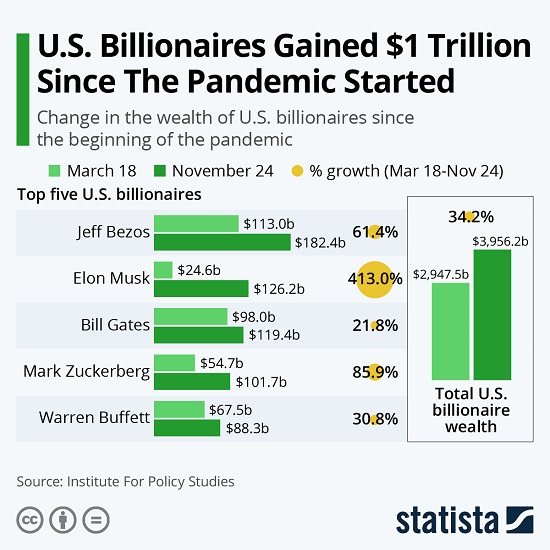
If you found value in this content, please join me in seeking solutions by
becoming
a $1/month patron of my work via patreon.com.
My new book is available!
A Hacker's Teleology: Sharing the Wealth of Our Shrinking Planet
20% and 15% discounts (Kindle $7, print $17,
audiobook now available $17.46)
Read excerpts of the book for free (PDF).
The Story Behind the Book and the Introduction.
Recent Videos/Podcasts:
AoE Salon #44: We say "Satyagraha", they say "sedition" with author Max Borders (1:03 hrs)
My COVID-19 Pandemic Posts
My recent books:
A Hacker's Teleology: Sharing the Wealth of Our Shrinking Planet
(Kindle $8.95, print $20,
audiobook $17.46)
Read the first section for free (PDF).
Will You Be Richer or Poorer?: Profit, Power, and AI in a Traumatized World
(Kindle $5, print $10, audiobook)
Read the first section for free (PDF).
Pathfinding our Destiny: Preventing the Final Fall of Our Democratic Republic
($5 (Kindle), $10 (print), (
audiobook):
Read the first section for free (PDF).
The Adventures of the Consulting Philosopher: The Disappearance of Drake
$1.29 (Kindle), $8.95 (print);
read the first chapters
for free (PDF)
Money and Work Unchained $6.95 (Kindle), $15 (print)
Read the first section for free (PDF).
Become
a $1/month patron of my work via patreon.com.
NOTE: Contributions/subscriptions are acknowledged in the order received. Your name and email remain confidential and will not be given to any other individual, company or agency.
|
Thank you, Mike B. ($5/month), for your superbly generous pledge to this site -- I am greatly honored by your support and readership. |
Thank you, Julian B. ($5/month), for your monstrously generous pledge to this site -- I am greatly honored by your support and readership. |
|
|
Thank you, John C. ($5/month), for your monumentally generous pledge to this site -- I am greatly honored by your support and readership. |
Thank you, Augustine W. ($5/month), for your splendidly generous pledge to this site -- I am greatly honored by your support and readership. |



















